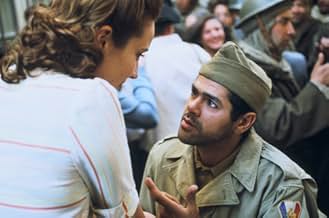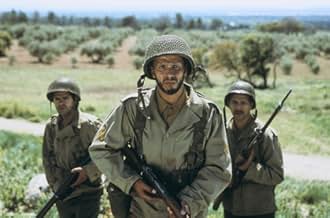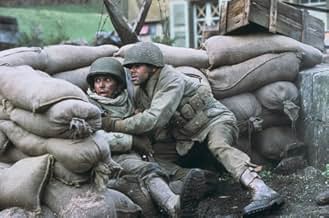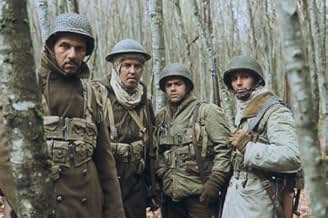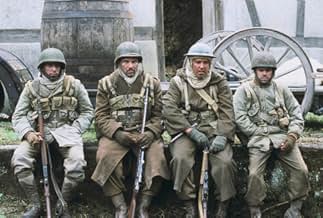AVALIAÇÃO DA IMDb
7,0/10
15 mil
SUA AVALIAÇÃO
Adicionar um enredo no seu idiomaDuring World War II, four North African men enlist in the French army to liberate that country from German oppression, and to fight French discrimination.During World War II, four North African men enlist in the French army to liberate that country from German oppression, and to fight French discrimination.During World War II, four North African men enlist in the French army to liberate that country from German oppression, and to fight French discrimination.
- Direção
- Roteiristas
- Artistas
- Indicado a 1 Oscar
- 9 vitórias e 17 indicações no total
- Direção
- Roteiristas
- Elenco e equipe completos
- Produção, bilheteria e muito mais no IMDbPro
Avaliações em destaque
The movie takes the viewer on a trip back to the second world war, showing how parts of the Arabic population fought with the French colonists for their freedom, against Nazi Germany trying to occupy Africa. As the movie evolves, other aspects than the fight for freedom and the brutality of war emerges. The viewer is reminded that the the social identity of the white bourgeoisie class and the stereotypes that follows not emerged with the current world of terrorism. Questions of power, humanity, religion, racism, love and honour follows the viewer through this exciting, emotional and realistic movie. Along with the plot and acting in this piece of work, the critical viewer should be satisfied.
It's 1943 Algeria. Muslims are recruited to fight for France. They go to Morocco to train and then arrive in Italy in 1944 to fight with the Allies. Saïd Otmari is poor illiterate mountain goat herder. Messaoud Souni is well spoken and falls for a French woman. Sergeant Martinez is a hardened leader willing to send the green recruits into suicidal charges but he hides his personal Arab connections. The men face racism in many blatant ways and Abdelkader gives voice to getting more equality.
This is an interesting part of the war that has been white-washed. The movie does struggle with a simple message as the men themselves have infighting about the war and their cause. Some of them fight for the money while others bought into the slogans. There is some good action and a solid final battle.
This is an interesting part of the war that has been white-washed. The movie does struggle with a simple message as the men themselves have infighting about the war and their cause. Some of them fight for the money while others bought into the slogans. There is some good action and a solid final battle.
For the first time this year the Weinstein Company has made something bearable --Hell, actually something good. The film is called Days of Glory (a title strangely reconfigured from Indigènes) and it chronicles a regiment in the war against Nazism, or, as the French call it, "liberty". But, the catch here is that these soldiers, they aren't French: They're Algerian and Morroquian. The film first suffers from superfluous paper-mâché clichés in order to demonstrate racial inequality, not as a subtle character study, but rather as an insolent whole which creates that annoying been-there, done-that feeling. Such a scene occurs when Abdelkader (Sami Bouajila) realizes that not all African troops are getting tomatoes, where as the French are. What does he do? He smashes them so "Nobody can have them". Director Rachid Bouchareb narrative is also first a bit fragmented, jumping from country to country as if they were stones. Eventually, it develops into an assured rhythm which corroborates with the film.
Brilliance in Days of Glory neither comes from ideas nor direction, but rather, through the magisterial acting, prized at Cannes, and small war vignettes. They are gripping and moving, like all war movies should be. These war scenes are powerful, and that is what makes up Days of Glory, because in the end, Days of Glory is one of the few good but flawed war films worth a damn. It has power and it is evident that it uses it wisely and vigorously.
Brilliance in Days of Glory neither comes from ideas nor direction, but rather, through the magisterial acting, prized at Cannes, and small war vignettes. They are gripping and moving, like all war movies should be. These war scenes are powerful, and that is what makes up Days of Glory, because in the end, Days of Glory is one of the few good but flawed war films worth a damn. It has power and it is evident that it uses it wisely and vigorously.
So you've done a great piece of work, and are awaiting your just rewards. Somehow along the way, someone else, by colour, creed, or connections, get all the recognition that you're due credit for. You feel frustrated, but you think of your rice bowl, and decide to grit your teeth and bear it, calling it just another day, secretly longing for a time where you are empowered to do something about it.
In the liberation of France during WWII, North African men were recruited and enlisted in the French army in the fight against the Nazis. Why do they do it? One reason is to escape poverty, and the holding on to the glimmer of hope that they can be accepted, when the war is over, as equals based on their fight for the "motherland". These soldiers, mujahedeens, fought hard, often being in the frontline, but always overlooked when it comes to recognition of basic military welfare and promotions, not that these rewards will cost an arm or a leg, nor are the fighters so hard up for them. All they're asking for was fair treatment, but all they got was discrimination.
Yes, and that is the pain. WWII movies are aplenty, but Days of Glory offered a unique look at the battles by a group of men, for what they deem their motherland and will defend with their blood, and what more, for a land of people who do not see them as equals. Loving someone who does not love you back, sounds familiar? And it's not just love, but sworn allegiance to protect at all costs.
The movie is well paced and straddled moments of action and quiet contemplation with aplomb. Credit must go to the ensemble cast of actors who play the warriors of North Africa, as they battle both the enemies on French soil, as well as enemies of men's heart. They grapple with trying to remain rational in their reason(s) to do what they're doing.
At times, watching this movie made me think about the recent flurry of mails to the press about foreign talent and the issue of citizenship, about NS obligations and whether PRs will flee at the first signs of trouble, or stand shoulder to shoulder with citizens (also, who are those who will flee?) in defending our land. What are the issues of contention, discrimination against, or general presumptions about foreigners here?
Those expecting all out battle scenes might be disappointed. In truth the movie's never about the glorification of gore, violence and war - most scenes aren't really blood splattering to draw in the crowds. Instead, if you'd prefer moments where you can think out loud about the issues presented, then this is for you. However, the final battle would please action fans, as it is well choreographed and executed, and you feel both the pain and victory from a bunch of tightly knit soldiers trying their very best to defend a small town, in a samurai- seven-ish sort of way, also reminiscent of Saving Private Ryan's somehow.
If you've missed this during the French Film Festival, don't fret. I believe this movie is also slated for general release. Keep a look out for it!
In the liberation of France during WWII, North African men were recruited and enlisted in the French army in the fight against the Nazis. Why do they do it? One reason is to escape poverty, and the holding on to the glimmer of hope that they can be accepted, when the war is over, as equals based on their fight for the "motherland". These soldiers, mujahedeens, fought hard, often being in the frontline, but always overlooked when it comes to recognition of basic military welfare and promotions, not that these rewards will cost an arm or a leg, nor are the fighters so hard up for them. All they're asking for was fair treatment, but all they got was discrimination.
Yes, and that is the pain. WWII movies are aplenty, but Days of Glory offered a unique look at the battles by a group of men, for what they deem their motherland and will defend with their blood, and what more, for a land of people who do not see them as equals. Loving someone who does not love you back, sounds familiar? And it's not just love, but sworn allegiance to protect at all costs.
The movie is well paced and straddled moments of action and quiet contemplation with aplomb. Credit must go to the ensemble cast of actors who play the warriors of North Africa, as they battle both the enemies on French soil, as well as enemies of men's heart. They grapple with trying to remain rational in their reason(s) to do what they're doing.
At times, watching this movie made me think about the recent flurry of mails to the press about foreign talent and the issue of citizenship, about NS obligations and whether PRs will flee at the first signs of trouble, or stand shoulder to shoulder with citizens (also, who are those who will flee?) in defending our land. What are the issues of contention, discrimination against, or general presumptions about foreigners here?
Those expecting all out battle scenes might be disappointed. In truth the movie's never about the glorification of gore, violence and war - most scenes aren't really blood splattering to draw in the crowds. Instead, if you'd prefer moments where you can think out loud about the issues presented, then this is for you. However, the final battle would please action fans, as it is well choreographed and executed, and you feel both the pain and victory from a bunch of tightly knit soldiers trying their very best to defend a small town, in a samurai- seven-ish sort of way, also reminiscent of Saving Private Ryan's somehow.
If you've missed this during the French Film Festival, don't fret. I believe this movie is also slated for general release. Keep a look out for it!
There's two types of French film .
1 ) The sort that is beloved by Cahiers Du Cinema that often feature people standing about talking about existentialist themes and often don't find a market outside France
2 ) The sort that is despised by Cahiers Du Cinema that often feature action and plot and appeal to an international market
DAYS OF GLORY is certainly in the second camp . The problem is that it's a bit too international . The theme of colonial soldiers fighting for the mother country could have easily have featured British dominion troops fighting in the Boer war , of Indian troops fighting at El Alamein or even of black Americans fighting in the second world war . Some people on this page have criticised this movie as not being a Gallic version of GLORY and you can see their point . There's little in the way of an idiosyncratic voice
Worse still despite the subtitles you could easily be watching a war film that was made in Hollywood . Much of the plot could have easily been lifted from Sam Fuller's THE BIG RED ONE as the story jumps from North Africa , Italy and eventually France . It's also impossible not to notice that the final climatic battle owes a lot to the climax of SAVING PRIVATE RYAN . Perhaps that's why DAYS OF GLORY received high praise down to its familiar story that English speaking fans of war films have seen so many times before ?
It could have been much worse though . On a technical level it's a competent enough movie and it doesn't go overboard that the Goumier troops are some how slaves press-ganged in to joining the Free French forces but it does effectively ignore the sometimes horrendous reputation Goumier troops had in Axis territories where women are concerned . The 1960 Italian film TWO WOMEN goes in to this in detail and you can imagine that's why the protagonists service in Italy is skated over very slightly . One wonders if the producers might have been worried about an international audience being alienated by bringing up the subject in any length ? As it it stands DAYS OF GLORY is a good enough war film though very traditional
1 ) The sort that is beloved by Cahiers Du Cinema that often feature people standing about talking about existentialist themes and often don't find a market outside France
2 ) The sort that is despised by Cahiers Du Cinema that often feature action and plot and appeal to an international market
DAYS OF GLORY is certainly in the second camp . The problem is that it's a bit too international . The theme of colonial soldiers fighting for the mother country could have easily have featured British dominion troops fighting in the Boer war , of Indian troops fighting at El Alamein or even of black Americans fighting in the second world war . Some people on this page have criticised this movie as not being a Gallic version of GLORY and you can see their point . There's little in the way of an idiosyncratic voice
Worse still despite the subtitles you could easily be watching a war film that was made in Hollywood . Much of the plot could have easily been lifted from Sam Fuller's THE BIG RED ONE as the story jumps from North Africa , Italy and eventually France . It's also impossible not to notice that the final climatic battle owes a lot to the climax of SAVING PRIVATE RYAN . Perhaps that's why DAYS OF GLORY received high praise down to its familiar story that English speaking fans of war films have seen so many times before ?
It could have been much worse though . On a technical level it's a competent enough movie and it doesn't go overboard that the Goumier troops are some how slaves press-ganged in to joining the Free French forces but it does effectively ignore the sometimes horrendous reputation Goumier troops had in Axis territories where women are concerned . The 1960 Italian film TWO WOMEN goes in to this in detail and you can imagine that's why the protagonists service in Italy is skated over very slightly . One wonders if the producers might have been worried about an international audience being alienated by bringing up the subject in any length ? As it it stands DAYS OF GLORY is a good enough war film though very traditional
Você sabia?
- CuriosidadesThe main actors, all of North African descent, did not know of France's discrimination towards foreign soldiers serving in the French army during World War 2 until filming began.
- Erros de gravaçãoIn the scene when the African soldiers raise the French tricolor over the Italian mountain top, the flag they use is polyester (i.e. a contemporary flag). World War II troops would have used a cotton flag.
- ConexõesFeatured in Indigenes: Le making of (2006)
- Trilhas sonorasLe lac des cygnes
Composed by Pyotr Ilyich Tchaikovsky
Principais escolhas
Faça login para avaliar e ver a lista de recomendações personalizadas
- How long is Days of Glory?Fornecido pela Alexa
Detalhes
Bilheteria
- Orçamento
- € 14.500.000 (estimativa)
- Faturamento bruto nos EUA e Canadá
- US$ 320.700
- Fim de semana de estreia nos EUA e Canadá
- US$ 10.996
- 10 de dez. de 2006
- Faturamento bruto mundial
- US$ 22.963.701
- Tempo de duração
- 2 h 3 min(123 min)
- Cor
- Mixagem de som
- Proporção
- 2.35 : 1
Contribua para esta página
Sugerir uma alteração ou adicionar conteúdo ausente


